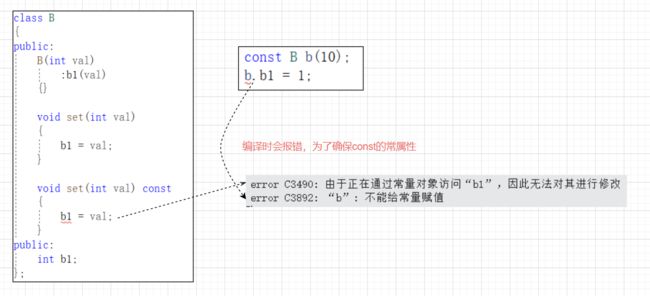- MongoDB
z小天才b
MongoDBmongodb数据库
一、MongoDB简介1.1什么是MongoDB?MongoDB是一个基于分布式文件存储的开源NoSQL数据库系统,由C++语言编写,旨在为Web应用提供可扩展的高性能数据存储解决方案。MongoDB将数据存储为一个文档,数据结构由键值对组成,类似于JSON对象,字段值可以包含其他文档、数组及文档数组。1.2MongoDB的核心特性文档型数据库:数据以BSON(BinaryJSON)格式存储灵活的
- 前端面试
请叫我子鱼
编程语言笔试面试程序员webinterview
前端面试之道JS基础知识点及常考面试题原始(Primitive)类型面试题:原始类型有哪几种?null是对象嘛?在JS中,存在着6种原始值,分别是:booleannullundefinednumberstringsymbol首先原始类型存储的都是值,是没有函数可以调用的对象(Object)类型面试题:对象类型和原始类型的不同之处?函数参数是对象会发生什么问题?在JS中,除了原始类型那么其他的都是对
- C++从入门到实战(六)类和对象(第二部分)C++成员对象及其实例化,对象大小与this详解
珹洺
C++学习之旅c++java开发语言数据结构sql汇编算法
C++从入门到实战(六)类和对象(第二部分)C++成员对象及其实例化,对象大小与this详解前言一、类和对象里面成员变量,成员函数是什么1.1成员变量1.2成员函数1.3成员变量、成员函数与局部变量的对比二、类的实例化2.1什么是实例化,实例化的概念2.2类的实例化过程1.类的定义2.实例化对象3.初始化对象4.访问对象的成员函数三、对象大小类对象大小计算示例四、this指针4.1this的原理4
- 初级:数组与字符串面试题深度剖析
佩奇的技术笔记
Java面试小册java
一、引言在Java开发中,数组和字符串是最常用的数据结构之一。面试官通过相关问题考察候选人对数组和字符串的理解和运用能力,以及在实际开发中解决相关问题的经验。本文将深入剖析常见的数组与字符串面试题,结合实际开发场景,帮助读者全面掌握这些知识点。二、数组面试题:如何对数组进行初始化和遍历?答案:数组的初始化可以使用直接初始化、动态初始化等方式。遍历数组可以使用传统的for循环、增强型for循环(fo
- C++有哪些高级特性值得学习?
c++
C++是一种功能丰富且复杂的编程语言,其中许多高级特性可以帮助开发者编写更高效、更安全、更灵活的代码。以下是一些值得深入学习的C++高级特性:模板编程(Templates)模板是C++中实现泛型编程的核心机制,允许开发者编写与数据类型无关的代码。模板函数cpp复制templateTmax(Ta,Tb){return(a>b)?a:b;}优点:模板函数可以处理多种数据类型,避免了代码重复。应用场景:
- 流浪地球 - 华为OD机试真题(E卷、C++)
什码情况
华为odc++算法数据结构面试机试
针对刷题难,效率慢,我们提供一对一算法辅导,针对个人情况定制化的提高计划(全称1V1效率更高)。有兴趣的同学可以扫码添加我们的微信(code5bug)了解,免费试课一下。题目描述流浪地球计划在赤道上均匀部署了N个转向发动机,按位置顺序编号为0~N。1).初始状态下所有的发动机都是未启动状态;2).发动机启动的方式分为”手动启动”和”关联启动”两种方式;3).如果在时刻1一个发动机被启动,下一个时刻
- CLR中的类型转换
qzy0621
C#C++笔记c++c#
CLR中的类型转换字符串类型转换容器类型转换自定义类型相互转换项目设置CLR(CommonLanguageRuntime,公共语言运行时)是微软.NET框架的核心组件,是微软对CLI标准的具体实现,负责管理和执行托管代码,提供跨语言互操作性、内存管理、安全性等关键服务CLR的类型转换机制是.NET框架中实现类型安全与多语言互操作的核心功能之一若调试不能命中,可参考C#通过CLR调用C++代码无法命
- c++ 红黑树
gezhengxu2024
教程c++开发语言c++
红黑树(Red-BlackTree)是一种自平衡的二叉查找树,它是由节点的颜色和结构性质来维持平衡的。红黑树的形成可以追溯到1972年,由RudolfBayer提出,并由Guibas和Sedgewick进一步完善。红黑树的作用主要在于提供高效的插入、删除和查找操作。它通过保持以下五个性质来实现平衡:每个节点是红色或黑色。根节点是黑色。每个叶子节点(NIL节点)是黑色。如果一个节点是红色,那么它的两
- 『 C++ 』线程与原子操作:高效并发编程的利器
锐策
C++多线程c++开发语言
文章目录为什么使用C++线程一、`C++11`std::thread`类的简单介绍1.1函数名与功能1.2`std::thread`类的简单介绍1.3线程函数参数二、线程同步与锁2.1线程同步与锁2.2死锁演示三、原子操作3.1原子操作与线程安全3.2原子操作的优势3.3CAS操作与自旋锁3.4原子操作与普通操作的汇编对比四、共享资源的线程安全问题4.1`std::shared_ptr`的线程安全
- c++ Templates Guide
Benny.LIU
c++template
c++TemplatesGuide前言FunctionTemplatesClassTemplatesNontypeTemplateParametersTrickyBasicsUsingTemplatesinPracticeBasicTemplateTerminology前言Typeparametersareintroducedwitheitherthekeywordtypenameorthekey
- C++ 各种map对比
越甲八千
【道阻且长C++】c++哈希算法开发语言
文章目录特点比较1.`std::map`2.`std::unordered_map`3.`std::multimap`4.`std::unordered_multimap`5.`hash_map`(SGISTL扩展)C++示例代码代码解释特点比较1.std::map底层实现:基于红黑树(一种自平衡的二叉搜索树)。元素顺序:元素按照键(key)的升序排列。键的唯一性:每个键只能出现一次,插入重复键的
- 【北上广深杭大厂AI算法面试题】计算机视觉篇...如何解决多尺度问题?
努力毕业的小土博^_^
AI算法题库人工智能算法计算机视觉深度学习神经网络
【北上广深杭大厂AI算法面试题】计算机视觉篇…如何解决多尺度问题?【北上广深杭大厂AI算法面试题】计算机视觉篇…如何解决多尺度问题?文章目录【北上广深杭大厂AI算法面试题】计算机视觉篇...如何解决多尺度问题?前言数据级别的多尺度模型架构上的多尺度表示FPN代码示例(PyTorch)说明其他多尺度处理方法总结欢迎铁子们点赞、关注、收藏!祝大家逢考必过!逢投必中!上岸上岸上岸!upupup大多数高校
- Java基础面试题学习
PowerCloud
java学习开发语言
转换成自已的语言来回答,来源小林coding、沉默王二以及其它资源和自已改编。1、概念1、说一下Java的特点我认为Java有很多特点首先是平台无关性:Java可以实现一次编译到处运行,因为Java的编译器将源代码编译成字节码,使得该字节码可以在任意装有JVM的操作系统上运行。其次是面向对象的性质:Java是面向对象编程语言,这种OOP的特性使得代码易于维护和重用。主要源于封装继承多态这三大特性。
- 腾讯技术岗位笔试&面试题(一)
TechPioneer_lp
互联网大厂技术面试c++面试数据结构个人开发算法
说在前面本篇文章是腾讯技术面试题目汇总第一篇。后续将持续推出互联网大厂,如阿里,腾讯,百度,美团,头条等技术面试题目,以及答案和分析。欢迎大家点赞关注转发。1.map插入方式有几种?用insert函数插入pair数据,mapStudent.insert(pair(1,“student_one”));用insert函数插入value_type数据mapStudent.insert(map::valu
- 单调栈详解【C/C++】
ん贤
算法单调栈算法c++数据结构贪心算法
前言:了解过单调队列后,你会发现单调栈的思想其实挺简单...当然前提是要了解一下什么是栈(stack)。看待一个问题,从不同角度,也许能有不同的收获。在数学家眼中,单调栈本质上是一个严格或非严格维护的单调递增或单调递减的数学结构。其核心在于动态的维护动态递增或递减的有序关系。而对于算法工程师,他们首先关注单调栈的核心优势:O(n)的时间复杂度。在需要遍历序列,并纪录极值的情况下(如接雨水、每日温度
- java面试题,既然你说到了创建线程池,那么你知道创建线程池的方式有哪几种吗?
java程序员CC
java开发语言
在Java中,创建线程池的方式有多种,其中比较常用的方式包括:FixedThreadPool(固定大小线程池):通过Executors.newFixedThreadPool(intn)方法创建,线程池中的线程数量固定为n,适合处理任务量稳定的场景。CachedThreadPool(缓存线程池):通过Executors.newCachedThreadPool()方法创建,线程池的线程数量不固定,根据
- 【C++】C++类
梵刹古音
C++学习笔记c++开发语言
文章目录面向对象程序设计思想类概述类的声明与定义类的实现对象的声明面向对象程序设计思想面向对象是一种符合人类思维习惯的程序设计思想。现实生活中存在各种形态不同的事物,这些事物之间存在着各种各样的联系。在程序中使用对象映射现实中的事物,利用对象之间的关系描述事物之间的联系,这种思想就是面向对象。面向过程是分析出解决问题所需要的步骤,然后用函数把这些步骤一一实现,使用的时候依次调用就可以了。面向对象不
- C++回顾 day2
星夜982
C++回顾算法数据结构c++
可以对指针进行引用,但是不存在引用的引用inta;int*p=&a;int*&rp=p;//此时rp是一个地址,要改变p的值要么*rp=XXX;//要么rp=&XXX;int&ra=a;int&&rra=ra;//这是不对的int&rra=ra;//也不能叫作引用的引用,因为rra也是a的引用可以对指针再取指针,但是不能对引用取指针inta;int&ra=a;int*p=&a;int**xp=&p
- C++避坑指南-数组越界
飞天赤狐
C++避坑指南c++
问题场景在访问数组时没有判断数组size,导致访问的索引号超过了数组size产生访问越界,程序出现异常行为示例代码实际情况比较多,我们来展开说明下原生数组访问越界#includeusingnamespacestd;voidArrayOut(){inta[]={23,33,1,32,5,9,10};for(inti=0;ia({23,33,1,32,5,9,10});for(inti=0;iempt
- 【绝对有用】C++ 数组越界 和并查集
fighting的码农(zg)-GPT
C++c++算法开发语言数据结构
遇到了一个地址越界错误(heap-buffer-overflow),通常这是因为程序试图读取或写入超过分配给缓冲区的内存空间。根据AddressSanitizer的错误报告,问题出现在您的Solution::longestConsecutive函数中,位于solution.cpp文件的第17行。下面是一些调试和解决这个问题的步骤:识别问题代码:错误报告显示问题发生在Solution::longes
- 动态数组索引越界问题
Caroline0071
C++基础知识动态数组索引越界vector
1、在C++中,可以采用几种不同的方法创建一个某种类型T的对象的数组。3种常用的方法如下:#defineN10//数组的长度N在编译时已知Tstatic_array[10];intn=20;//数组的长度n是在运行时计算的T*dynamic_array=newT[n];std::vectorvector_array;//数组的长度可以在运行时进行修改当然,我们仍然可以使用calloc()和mall
- c++类和对象(中篇)上
朽棘不雕
c++学习c++开发语言
在上一篇博客中学习了一些类和对象的基础,下面让我们一起来看看这部分比较难以理解的重点部分吧.在中篇我主要学习了默认成员函数以及其中包含的运算符重载.在这篇中主要分享下默认成员函数的前三个.赋值函数以及其中包含的运算符重载的知识见下.类和对象的默认成员函数默认成员函数就是指在一个类中,就算用户没有显示实现,编译器也会自动生成的成员函数.在一个类中,编译器会默认生成6个成员函数.分别是构造函数,析构函
- MDK(Keil μVision 5)的编译过程及文件类型全解
froxy
工具armstm32
MDK(KeilμVision5)的编译过程及文件类型全解一、编译过程MDK的编译过程主要分为预处理、编译、汇编、链接、生成可执行文件、格式转换六个阶段。以下是详细流程:预处理(Preprocessing)工具:armcc(ARMC/C++编译器)输入文件:.c(C源文件)、.h(头文件)输出文件:.i(预处理后的临时文件,默认不保存)作用:展开宏、处理条件编译指令(如#ifdef)、合并头文件到
- 面试题:session和cookie的区别?客户端禁用cookie, session还能用吗?
来之前不会起名字
面试题java服务器javascript面试
session和cookie的区别区别一:存放位置不同cookie数据保存在客户端,session数据保存在服务端。区别二:session比cookie安全cookie不是很安全,别人可以分析存放在本地的COOKIE并进行COOKIE欺骗,考虑安全选session区别三:cookie对服务器造成的压力比session小session会在一定时间内保存在服务器上。当访问增多,会比较占用你服务器的性能
- 【C++】——精细化哈希表架构:理论与实践的综合分析
m0_74825238
面试学习路线阿里巴巴c++散列表架构java
先找出你的能力在哪里,然后再决定你是谁。——塔拉·韦斯特弗《你当像鸟飞往你的山》目录1.C++与哈希表:核心概念与引入2.哈希表的底层机制:原理与挑战2.1核心功能解析:效率与灵活性的平衡2.2哈希冲突的本质:问题与应对策略2.3开散列与闭散列:两大解决方案的比较3.闭散列的精确实现:从设计到优化3.1整体框架设计:面向扩展的架构3.2仿函数的灵活性:高效哈希的关键3.3插入操作:冲突检测与位置分
- Microsoft Visual C++ Redistributable 各版本安装包合集
Eric Woo X
C++Windowsmicrosoftc++开发语言
MicrosoftVisualC++Redistributable2019x86:https://aka.ms/vs/16/release/VC_redist.x86.exex64:https://aka.ms/vs/16/release/VC_redist.x64.exeMicrosoftVisualC++Redistributable2017x86:https://go.microsoft.c
- C++多线程
苜柠
C++c++
线程:async和thread锁:C++11中的std::atomic和std::mutex推荐文章:C++11多线程(std::thread)详解_c++11线程使用-CSDN博客c++标准库多线程-云山漫卷-博客园std::lock_guard是一个RAII风格的简单的锁管理器,它在构造时自动加锁,在析构时自动解锁。#include#include#include#includestd::mu
- Qt for WebAssembly程序中文乱码问题处理过程
muren
Qtc++qtwasm开发语言
一、环境操作系统DeepinV23Qt版本6.8.2编程语言C++二、问题现象QtforWebAssembly应用在浏览器页面上英文字母显示正常,中文显示为乱码。经测试分析原因为默认字体不能正常显示汉字。三、处理过程1.准备中文字体文件从Windows下复制宋体简体字体文件。C:\Windows\Fonts\simsun.ttc2.添加资源文件resources.qrcsimsun.ttc3.Qt
- C++中函数模板与类模板的简单使用
CoderIsArt
C++11c++函数模板类模板
在C++中,模板是实现泛型编程的核心机制,允许开发者编写与类型无关的代码。以下是函数模板和类模板的详细介绍及实际示例。一、函数模板定义函数模板通过参数化类型实现泛型操作,只需编写一次代码即可处理多种数据类型,避免重复。语法template返回类型函数名(参数列表){...}typenameT表示类型占位符,编译时根据实参类型自动实例化。真实示例交换两个值(swap)templatevoidswa
- 大模型最新面试题系列:微调篇之微调基础知识
人肉推土机
大模型最新面试题集锦大全面试人工智能AI编程大模型微调LLM
一、全参数微调(Full-Finetune)vs参数高效微调(PEFT)对比1.显存使用差异全参数微调:需存储所有参数的梯度(如GPT-3175B模型全量微调需约2.3TB显存)PEFT:以LoRA为例,仅需存储低秩矩阵参数(7B模型使用r=16的LoRA时显存占用减少98%)实战经验:在A10080GB显存下,全量微调LLaMA-7B需DeepSpeedZero3优化,而LoRA可直接单卡运行2
- eclipse maven
IXHONG
eclipse
eclipse中使用maven插件的时候,运行run as maven build的时候报错
-Dmaven.multiModuleProjectDirectory system propery is not set. Check $M2_HOME environment variable and mvn script match.
可以设一个环境变量M2_HOME指
- timer cancel方法的一个小实例
alleni123
多线程timer
package com.lj.timer;
import java.util.Date;
import java.util.Timer;
import java.util.TimerTask;
public class MyTimer extends TimerTask
{
private int a;
private Timer timer;
pub
- MySQL数据库在Linux下的安装
ducklsl
mysql
1.建好一个专门放置MySQL的目录
/mysql/db数据库目录
/mysql/data数据库数据文件目录
2.配置用户,添加专门的MySQL管理用户
>groupadd mysql ----添加用户组
>useradd -g mysql mysql ----在mysql用户组中添加一个mysql用户
3.配置,生成并安装MySQL
>cmake -D
- spring------>>cvc-elt.1: Cannot find the declaration of element
Array_06
springbean
将--------
<?xml version="1.0" encoding="UTF-8"?>
<beans xmlns="http://www.springframework.org/schema/beans"
xmlns:xsi="http://www.w3
- maven发布第三方jar的一些问题
cugfy
maven
maven中发布 第三方jar到nexus仓库使用的是 deploy:deploy-file命令
有许多参数,具体可查看
http://maven.apache.org/plugins/maven-deploy-plugin/deploy-file-mojo.html
以下是一个例子:
mvn deploy:deploy-file -DgroupId=xpp3
- MYSQL下载及安装
357029540
mysql
好久没有去安装过MYSQL,今天自己在安装完MYSQL过后用navicat for mysql去厕测试链接的时候出现了10061的问题,因为的的MYSQL是最新版本为5.6.24,所以下载的文件夹里没有my.ini文件,所以在网上找了很多方法还是没有找到怎么解决问题,最后看到了一篇百度经验里有这个的介绍,按照其步骤也完成了安装,在这里给大家分享下这个链接的地址
- ios TableView cell的布局
张亚雄
tableview
cell.imageView.image = [UIImage imageNamed:[imageArray objectAtIndex:[indexPath row]]];
CGSize itemSize = CGSizeMake(60, 50);
&nbs
- Java编码转义
adminjun
java编码转义
import java.io.UnsupportedEncodingException;
/**
* 转换字符串的编码
*/
public class ChangeCharset {
/** 7位ASCII字符,也叫作ISO646-US、Unicode字符集的基本拉丁块 */
public static final Strin
- Tomcat 配置和spring
aijuans
spring
简介
Tomcat启动时,先找系统变量CATALINA_BASE,如果没有,则找CATALINA_HOME。然后找这个变量所指的目录下的conf文件夹,从中读取配置文件。最重要的配置文件:server.xml 。要配置tomcat,基本上了解server.xml,context.xml和web.xml。
Server.xml -- tomcat主
- Java打印当前目录下的所有子目录和文件
ayaoxinchao
递归File
其实这个没啥技术含量,大湿们不要操笑哦,只是做一个简单的记录,简单用了一下递归算法。
import java.io.File;
/**
* @author Perlin
* @date 2014-6-30
*/
public class PrintDirectory {
public static void printDirectory(File f
- linux安装mysql出现libs报冲突解决
BigBird2012
linux
linux安装mysql出现libs报冲突解决
安装mysql出现
file /usr/share/mysql/ukrainian/errmsg.sys from install of MySQL-server-5.5.33-1.linux2.6.i386 conflicts with file from package mysql-libs-5.1.61-4.el6.i686
- jedis连接池使用实例
bijian1013
redisjedis连接池jedis
实例代码:
package com.bijian.study;
import java.util.ArrayList;
import java.util.List;
import redis.clients.jedis.Jedis;
import redis.clients.jedis.JedisPool;
import redis.clients.jedis.JedisPoo
- 关于朋友
bingyingao
朋友兴趣爱好维持
成为朋友的必要条件:
志相同,道不合,可以成为朋友。譬如马云、周星驰一个是商人,一个是影星,可谓道不同,但都很有梦想,都要在各自领域里做到最好,当他们遇到一起,互相欣赏,可以畅谈两个小时。
志不同,道相合,也可以成为朋友。譬如有时候看到两个一个成绩很好每次考试争做第一,一个成绩很差的同学是好朋友。他们志向不相同,但他
- 【Spark七十九】Spark RDD API一
bit1129
spark
aggregate
package spark.examples.rddapi
import org.apache.spark.{SparkConf, SparkContext}
//测试RDD的aggregate方法
object AggregateTest {
def main(args: Array[String]) {
val conf = new Spar
- ktap 0.1 released
bookjovi
kerneltracing
Dear,
I'm pleased to announce that ktap release v0.1, this is the first official
release of ktap project, it is expected that this release is not fully
functional or very stable and we welcome bu
- 能保存Properties文件注释的Properties工具类
BrokenDreams
properties
今天遇到一个小需求:由于java.util.Properties读取属性文件时会忽略注释,当写回去的时候,注释都没了。恰好一个项目中的配置文件会在部署后被某个Java程序修改一下,但修改了之后注释全没了,可能会给以后的参数调整带来困难。所以要解决这个问题。
&nb
- 读《研磨设计模式》-代码笔记-外观模式-Facade
bylijinnan
java设计模式
声明: 本文只为方便我个人查阅和理解,详细的分析以及源代码请移步 原作者的博客http://chjavach.iteye.com/
/*
* 百度百科的定义:
* Facade(外观)模式为子系统中的各类(或结构与方法)提供一个简明一致的界面,
* 隐藏子系统的复杂性,使子系统更加容易使用。他是为子系统中的一组接口所提供的一个一致的界面
*
* 可简单地
- After Effects教程收集
cherishLC
After Effects
1、中文入门
http://study.163.com/course/courseMain.htm?courseId=730009
2、videocopilot英文入门教程(中文字幕)
http://www.youku.com/playlist_show/id_17893193.html
英文原址:
http://www.videocopilot.net/basic/
素
- Linux Apache 安装过程
crabdave
apache
Linux Apache 安装过程
下载新版本:
apr-1.4.2.tar.gz(下载网站:http://apr.apache.org/download.cgi)
apr-util-1.3.9.tar.gz(下载网站:http://apr.apache.org/download.cgi)
httpd-2.2.15.tar.gz(下载网站:http://httpd.apac
- Shell学习 之 变量赋值和引用
daizj
shell变量引用赋值
本文转自:http://www.cnblogs.com/papam/articles/1548679.html
Shell编程中,使用变量无需事先声明,同时变量名的命名须遵循如下规则:
首个字符必须为字母(a-z,A-Z)
中间不能有空格,可以使用下划线(_)
不能使用标点符号
不能使用bash里的关键字(可用help命令查看保留关键字)
需要给变量赋值时,可以这么写:
- Java SE 第一讲(Java SE入门、JDK的下载与安装、第一个Java程序、Java程序的编译与执行)
dcj3sjt126com
javajdk
Java SE 第一讲:
Java SE:Java Standard Edition
Java ME: Java Mobile Edition
Java EE:Java Enterprise Edition
Java是由Sun公司推出的(今年初被Oracle公司收购)。
收购价格:74亿美金
J2SE、J2ME、J2EE
JDK:Java Development
- YII给用户登录加上验证码
dcj3sjt126com
yii
1、在SiteController中添加如下代码:
/**
* Declares class-based actions.
*/
public function actions() {
return array(
// captcha action renders the CAPTCHA image displ
- Lucene使用说明
dyy_gusi
Lucenesearch分词器
Lucene使用说明
1、lucene简介
1.1、什么是lucene
Lucene是一个全文搜索框架,而不是应用产品。因此它并不像baidu或者googleDesktop那种拿来就能用,它只是提供了一种工具让你能实现这些产品和功能。
1.2、lucene能做什么
要回答这个问题,先要了解lucene的本质。实际
- 学习编程并不难,做到以下几点即可!
gcq511120594
数据结构编程算法
不论你是想自己设计游戏,还是开发iPhone或安卓手机上的应用,还是仅仅为了娱乐,学习编程语言都是一条必经之路。编程语言种类繁多,用途各 异,然而一旦掌握其中之一,其他的也就迎刃而解。作为初学者,你可能要先从Java或HTML开始学,一旦掌握了一门编程语言,你就发挥无穷的想象,开发 各种神奇的软件啦。
1、确定目标
学习编程语言既充满乐趣,又充满挑战。有些花费多年时间学习一门编程语言的大学生到
- Java面试十问之三:Java与C++内存回收机制的差别
HNUlanwei
javaC++finalize()堆栈内存回收
大家知道, Java 除了那 8 种基本类型以外,其他都是对象类型(又称为引用类型)的数据。 JVM 会把程序创建的对象存放在堆空间中,那什么又是堆空间呢?其实,堆( Heap)是一个运行时的数据存储区,从它可以分配大小各异的空间。一般,运行时的数据存储区有堆( Heap)和堆栈( Stack),所以要先看它们里面可以分配哪些类型的对象实体,然后才知道如何均衡使用这两种存储区。一般来说,栈中存放的
- 第二章 Nginx+Lua开发入门
jinnianshilongnian
nginxlua
Nginx入门
本文目的是学习Nginx+Lua开发,对于Nginx基本知识可以参考如下文章:
nginx启动、关闭、重启
http://www.cnblogs.com/derekchen/archive/2011/02/17/1957209.html
agentzh 的 Nginx 教程
http://openresty.org/download/agentzh-nginx-tutor
- MongoDB windows安装 基本命令
liyonghui160com
windows安装
安装目录:
D:\MongoDB\
新建目录
D:\MongoDB\data\db
4.启动进城:
cd D:\MongoDB\bin
mongod -dbpath D:\MongoDB\data\db
&n
- Linux下通过源码编译安装程序
pda158
linux
一、程序的组成部分 Linux下程序大都是由以下几部分组成: 二进制文件:也就是可以运行的程序文件 库文件:就是通常我们见到的lib目录下的文件 配置文件:这个不必多说,都知道 帮助文档:通常是我们在linux下用man命令查看的命令的文档
二、linux下程序的存放目录 linux程序的存放目录大致有三个地方: /etc, /b
- WEB开发编程的职业生涯4个阶段
shw3588
编程Web工作生活
觉得自己什么都会
2007年从学校毕业,凭借自己原创的ASP毕业设计,以为自己很厉害似的,信心满满去东莞找工作,找面试成功率确实很高,只是工资不高,但依旧无法磨灭那过分的自信,那时候什么考勤系统、什么OA系统、什么ERP,什么都觉得有信心,这样的生涯大概持续了约一年。
根本不是自己想的那样
2008年开始接触很多工作相关的东西,发现太多东西自己根本不会,都需要去学,不管是asp还是js,
- 遭遇jsonp同域下变作post请求的坑
vb2005xu
jsonp同域post
今天迁移一个站点时遇到一个坑爹问题,同一个jsonp接口在跨域时都能调用成功,但是在同域下调用虽然成功,但是数据却有问题. 此处贴出我的后端代码片段
$mi_id = htmlspecialchars(trim($_GET['mi_id ']));
$mi_cv = htmlspecialchars(trim($_GET['mi_cv ']));
贴出我前端代码片段:
$.aj



